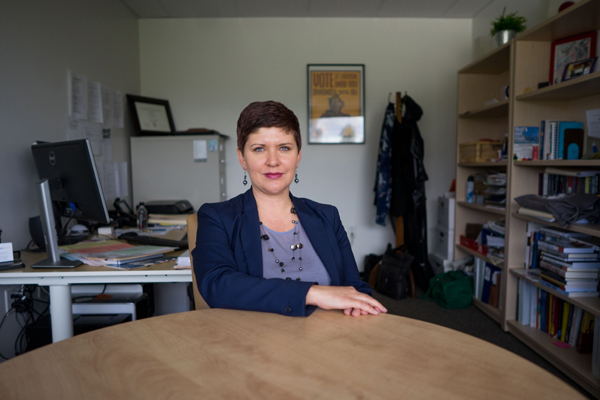
Dr. Melinda Jackson, chair of the SJSU Digital Polarization Initiative Committee, says: “It’s good for all of us to become critical consumers of information.” (Photo: James Tensuan, ’15 Journalism)
By David Goll
Two years ago, few Americans had heard of “digital polarization” — including today’s “digital native” college students. But the topic has become so important, it’ll be the subject of new curriculum and research at 11 campuses nationwide next fall, including San Jose State University.
The schools are participating in “Digital Polarization: Promoting Online Civic Literacy,” a project from the American Association of State Colleges and Universities. SJSU is the only California university in the group that includes Washington State University, Vancouver; Metropolitan State University in Denver; Texas A&M University, Central Texas; Indiana University, Kokomo; the University of North Carolina, Charlotte; and The City University of New York, among other schools.
According to the AASCU, the “DigiPo” initiative is an effort to supply college students with the skills to “combat digital polarization and fake news.” The issue grew out of the contentious, controversial 2016 presidential election and is tailor-made for political science students, according to Dr. Melinda Jackson, co-chair of the SJSU Digital Polarization Initiative Committee and chair of the Department of Political Science. It also touches on other areas of study, such as health and science.
“Fake news is certainly in the news,” Jackson said. “There has always been propaganda. What’s different today is the speed and reach of information because of the internet and social media. The internet has created a certain amount of democratization of information, but there’s also a downside. We’re all more likely to find information credible if we agree with it. It’s good for all of us to become critical consumers of information.”
As a political “psychologist,” Jackson said she teaches her students how emotions can affect voting behavior.
The SJSU committee also includes faculty and staff from the library and housing departments. The group is exploring how to incorporate instructional materials into curriculum, create outreach efforts and convene discussion groups on campus, including in university residence halls. Other committee members are Tom Moriarty, English professor and director of the Writing Across the Curriculum program; Kathleen McConnell, associate professor in the Department of Communication Studies; and Darrien Rice, assistant director for Academic Initiatives.
Jackson is seeking additional SJSU faculty members interested in incorporating web literacy instruction into their classes beginning in fall 2018.
Ann Agee, senior assistant librarian and online learning librarian at the university’s Dr. Martin Luther King, Jr. Library is co-chair of the SJSU initiative committee along with Jackson. Agee said her involvement with the subject dates to January 2017. When working with the Department of English and Comparative Literature, she learned of a Stanford History Education Group study in which a majority of high school and college students in that project were unable to discern between credible information and misinformation. They even had trouble distinguishing between advertisements and news articles.
“They did not do well,” Agee said. “When you consider the effect of fake news, it can destroy trust. Civilization is based on trust. At some point, we have to trust individuals and institutions. Looking at the 2016 election, Russian bots attacked the foundations of democratic institutions. And when people share fake news on social media, they destroy their own credibility online.”
Agee said instruction this fall should include how students can learn to evaluate information and avoid sketchy information sources, how to employ critical thinking techniques and how to “intervene” by exposing faulty information online. Jackson said committee members are now brainstorming curriculum content and how best to roll it out. Program data will be collected and analyzed at the end of the semester.
Helping students become discerning consumers of online information has become a high priority in the library world, Agee said. At the biennial meeting of the California Academic & Research Libraries Association in April, Agee presented on the subject — one of five sessions on fake news.
Mike Caulfield, director of Blended and Networked Learning at the Vancouver, Wash., campus of Washington State University, is leading the nationwide digital polarization initiative and has developed curriculum that will be piloted this fall. SJSU’s team will evaluate the lessons and build upon it.
“What we’ve found is giving students a few simple techniques to verify and investigate the information that comes to them in their daily feeds can make a massive difference,” he said in an AASCU press release. “The trick is giving students the right skills — skills for 2018, not 1998.”
Jackson said it’s crucial to do so.
“No question students today are not as knowledgeable about credible sources of journalism and information,” she said. “Most students get their information online, and frequently from social media, Instagram, Twitter and Facebook. Informational literacy is a huge issue in the 21st century.”